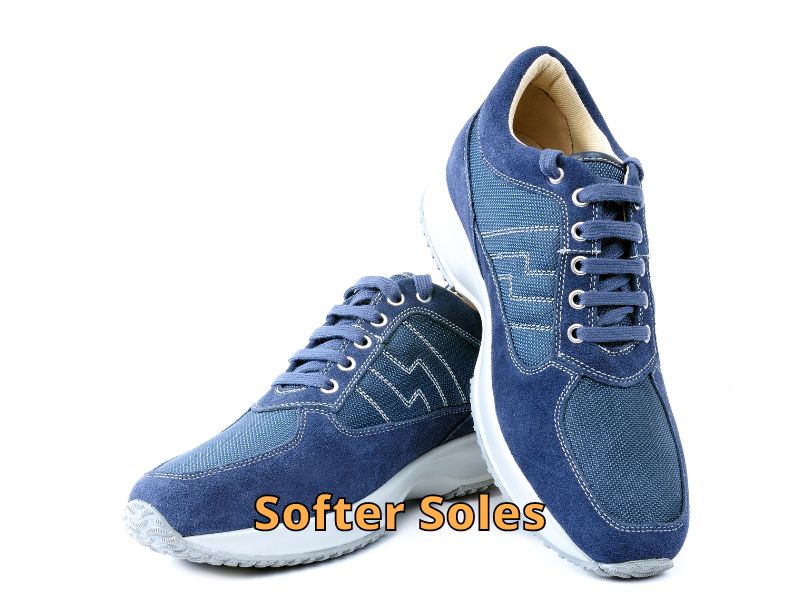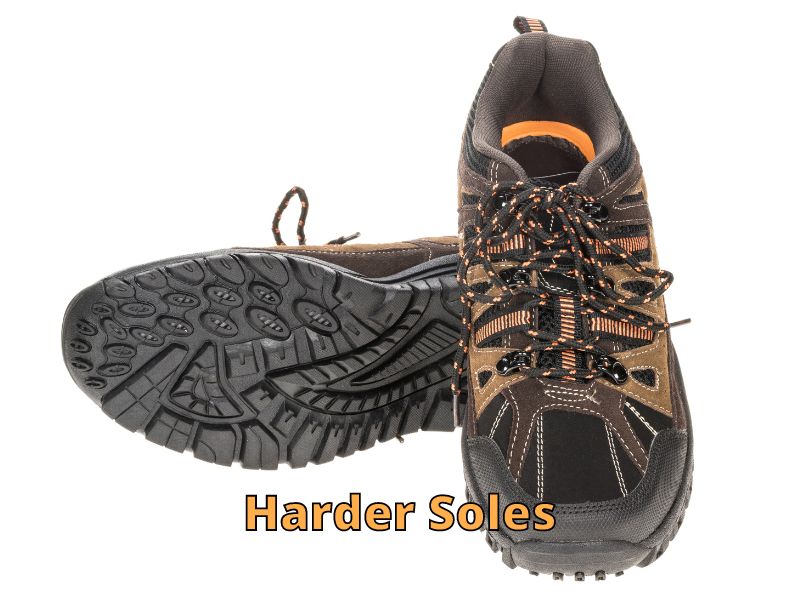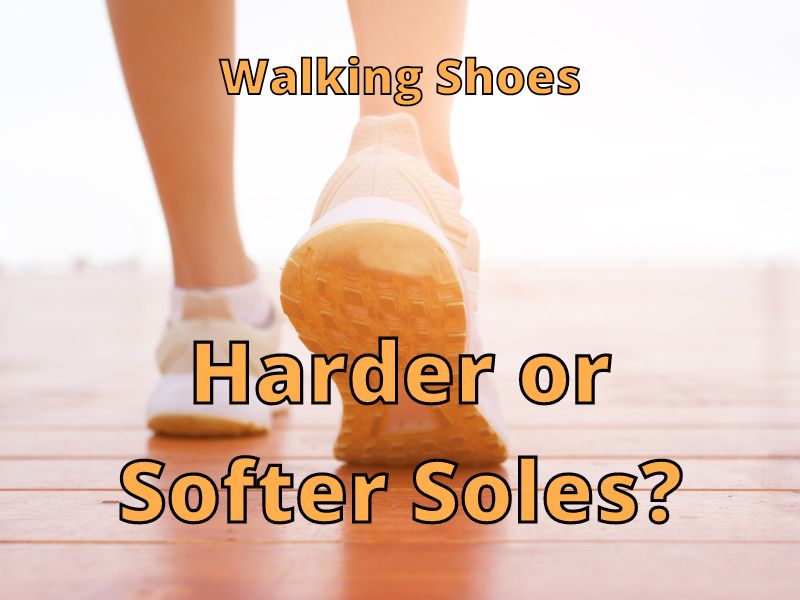Have you ever wondered what kind of shoes are the best for walking in? Some people have a strong preference for hard soles vs soft soles, but you might want to know what is actually better for your feet, rather than just what feels comfiest.
It is generally agreed that soft-soled walking shoes with arch support are better for your feet. These are more flexible and more comfortable, and they should offer better support because they generally conform to the arch of your foot. They tend to cause less foot pain and offer better protection when you’re walking.
Of course, it’s not as simple as that; there are other things to consider. That’s why we’re going to use this article to look at whether hard-soled or soft-soled shoes are best for walking.
Why Might Soft-Soled Shoes Be Best For Walking?

Most lightweight walking shoes have soft soles because they are more comfortable. They tend to weigh less, which reduces the drag on your feet with every step, and they are often more comfortable because they fit firmly around your feet and cushion them from the impact of walking.
A soft sole will fit against the arch of your foot and offer support, and they let your feet bend with the contours of the land, which can reduce the fatigue of walking.
However, it is possible to go too soft, and soft soles aren’t the best option if you’re going to be doing more strenuous walking, such as mountain climbing or serious hiking.
Really soft soles will wear down very fast, leaving your feet unprotected and exposed to the stones on the trail. They also won’t offer as much support because they’ll be so soft that they just squash under your weight. You, therefore, want to choose a shoe that feels very comfortable but isn’t so soft it flattens when you take a step.
What Are The Pros Of Soft-Soled Walking Shoes?
One of the biggest advantages of soft soles is that they will be comfy on your feet, which is a key aspect of a good walking shoe. This is probably the biggest reason to choose them, because comfort is the most significant part of walking regularly.
Soft soles usually reduce the impact on your feet fairly well. This helps reduce the impact on your joints, causing less strain on the ankles, knees, and hips. As long as there is correct arch support for your foot type.
These shoes may also be safer on uneven ground because they will be more nimble, and many people prefer a lighter, more flexible feel. They’ll bend to fit into dips and hollows, giving your foot better contact with the ground. This may reduce the risk of you slipping and falling at any point.
They are also less likely to make your feet ache because they will let them bend and move more freely. This makes it easier to keep going, even over the course of a long walk. Overall, soft soles are generally best for medium hikes and challenging walks.
What Are The Cons Of Soft-Soled Walking Shoes?
The biggest drawback of soft-soled walking shoes is probably that the midsoles have thinner shanks, and this can make walking less comfortable on rough terrain. If you are carrying a backpack or something else heavy, you’ll find that soft-soled shoes make for a less comfortable walk overall.
Furthermore, soft-soled shoes are likely to wear down more quickly than hard-soled shoes, and they won’t protect your feet as much. You may end up with bruises from boulders and other debris on your path, especially if you are walking somewhere bumpy or rocky.
Although soft shoes allow for more foot movement, they provide less protection from rough terrain. This can lead to sore feet if you walk in challenging areas. Some may be too soft to provide adequate arch support.
In addition, a soft-sole walking shoe without arch support is generally not good for your foot. Feet need lots of support unless you have super strong arches already. Soft shoes tend to reduce the amount of muscle use. The soft sole absorbs all the impact, leaving your arches with less work to do.
What Are The Pros Of Hard-Soled Shoes?

Hard-soled shoes aren’t ideal for walking in most cases, because their stiffness will stop your feet from bending and leave you feeling less comfortable. However, they do have some advantages too; they are much tougher and more protective than soft soles.
Hard soles with good support may be better for those walking long distances. The shoe will do most of the work instead of your feet when it comes to support and impact protection. They’ll protect your feet preventing them from being bruised by your surroundings.
They are also much safer if you are walking somewhere with a risk of long thorns, because they’ll protect your feet from puncture wounds far more effectively than soft-soled shoes.
Hard-soled shoes tend to last better than soft-soled shoes, because there is less movement, so they don’t wear down as fast. You can depend upon a pair of hard-soled shoes for a lot longer, so you’ll likely spend less money overall on your footwear.
What Are The Cons Of Hard-Soled Shoes?
There are quite a few drawbacks associated with hard-soled shoes. They tend to be heavier, which means you’ve got more drag with every step you take. This can cause fatigue and achiness far more quickly than with lighter shoes. Weight is a really significant factor in your walking shoes.
Secondly, they tend to give you less grip on the ground. Because they don’t bend as easily, they won’t conform to unevenness, which means less contact between your foot and the floor. This may increase your risk of slipping, especially if you’re walking uphill or on wet ground.
A further drawback of hard-soled shoes is that they may not conform to your feet as effectively as soft-soled shoes. This makes them far less comfortable to wear, because they prevent your feet from bending fully when you step forward. You may find that your feet ache when you take the shoes off.
The lack of conformity may also make them move around more on your foot, since you probably won’t be able to lace them as tightly. This makes them slightly less safe (although it depends on how well the shoe fits and the sole type).
Conclusion
Soft-soled shoes are generally preferable for walking and light hiking, because they give you improved traction, and they are more comfortable and weigh less. Hard-soled shoes have their place, but they are heavy and less comfortable, especially over the course of a long walk. On the whole, soft-soled shoes are the better option, therefore.
Meta Description
Getting the right kinds of shoes for walking can make a huge difference to how your feet feel, so are soft soles or hard ones better?

